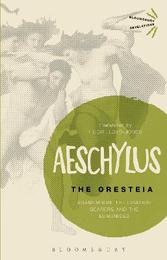
|
The Oresteia: Agamemnon, The Libation Bearers and The Eumenides
Paperback / softback
Main Details
Description
First performed in 458BC, Aeschylus's trilogy of plays - known collectively as The Oresteia - remains perhaps the great masterpiece of Ancient tragic drama. Telling the bloody story of the House of Atreus, Aeschylus's tragedy stages an eternal debate about justice and revenge that remains relevant more than two millenia later. Now available in the Bloomsbury Revelations series in this classic and authoritative translation by Hugh Lloyd-Jones, this book contains the text of all three plays - Agamemnon, The Libation Bearers and The Eumenides - with extensive scholarly annotation throughout.
Author Biography
Aeschylus (525-456 BC), the father of Greek tragic drama, is considered to be the first great writer in the Western theatrical tradition. Only seven plays, of over 70 known titles, are extant. These are The Persians (472 BC), Seven Against Thebes (469 BC), Prometheus Bound (c. 460 BC), The Suppliant Women (c. 460 BC), and the Oresteia trilogy (458 BC), comprising Agamemnon, Choephoroi, and Eumenides. Sir Hugh Lloyd-Jones (1922-2009) was Regius Professor of Greek at the University of Oxford, UK. Described by the Telegraph as 'one of the foremost classical scholars of his generation,' his translations included the plays of Sophocles and the fragments of Aeschylus.
|